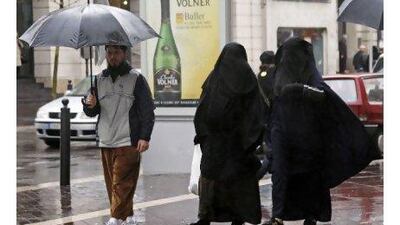I moved to the UAE four years ago, having lived most of my adult life in the United States and Europe. Being of Lebanese origin, I knew to expect the hospitality and generosity that are engrained in the local culture. I would like to share a brief story with the readers of The National - many of whom are also expatriates who may or may not have had ample opportunity to get to know the Emirati people up close and personal - about a recent experience that speaks to the good nature of the population.
While on a visit to one of the stores in Abu Dhabi a few weeks ago, I could not find a proper spot so I parked my car over a large sandy patch in an adjacent section. As it was dark, I did not realise that the sand underneath was extremely fine and my car subsequently sank deep into the sand. Many passersby witnessed my fruitless attempts to get my car out, some perhaps finding the whole thing amusing. I did not expect that anyone would step in to help and opted to call a towing service, knowing that it would be a long while before they would arrive at the scene.
As I waited, a concerned Emirati approached me. He insisted on lending a helping hand and he would not hear otherwise. He contacted his friends who showed up minutes later with two 4x4 vehicles. Within a few short minutes, they managed to successfully pull my car out from the sand.
What these kind individuals did to help a stranger in need is surely commendable and their actions were selfless and noble. I may not have had the chance to thank them properly, so I would like to convey through your paper my gratitude to this country and its good people.
Mohamed Sharara, Abu Dhabi
Three views on the niqab ban
The opinion article by Faisal al Yafai Sarkozy has struck at the heart of Europe's liberty (April 12) decried both the practice and principle of the "burqa ban" in France. I couldn't agree more. The basic human rights of liberation, speaking and living the way we want, are being openly violated in the name of implementing a law for the security of the nation. Mr Faisal pinpointed the major security threat the France is going through and in no way does wearing a veil constitute a major security issue. The justifications and lame excuses by the French president's allies are deficient not only in terms of reason but they violate basic human rights.
Zahra Khan, Abu Dhabi
I would like to congratulate Faisal al Yafai for his excellent commentary. I am a Saudi national. I have lived almost all my life in France, I am married and have three children, all born in Paris. We love this country for its beauty, its art and its history. In the last few years, we have seen a big change in attitude towards the Muslim community.
This year, my youngest daughter who is studying law asked us to continue her studies in Abu Dhabi, although she had been accepted by the Sorbonne in Paris. We left France with a lot of bitterness, asking ourselves: "Is this the country of liberty, of human rights and haven for excluded populations?"
HC, Abu Dhabi
I refer to 'Anti-Islam' debate on secularism has France in an uproar (April 1). When in Rome, do as the Romans do - simple as that. Just like all expatriates in Middle Eastern countries have to follow certain rules, even though they might not be Muslim or of Arab descent, the same should apply to Arab/Muslims who choose to live in Europe or another part of the world.
If my wife and I decided to live in Saudi Arabia, my wife would have to stop driving, wear a full veil and not appear in public with anyone else besides me. That is OK for Saudi women who are subject to these conditions, but not for me and my wife who are from Europe.
We would, however, respect the country and its cultural beliefs and religion, and would do what is required of us to integrate with society. By the same token, if Arabs/Muslims decide to live in France, and there is a ban on the veil, they just have to accept it. It is not racial discrimination or restrictions on religious freedom. The veil is a cultural item of clothing anyway, not a religious requirement by Islam.
Yanni Yunani, Abu Dhabi
More on Mawaqif parking woes
I refer to the news article Mawaqif parking spaces to double by end of year (April 12). Well, they're at least making lots of money off this venture - at whose expense? We pay for yearly parking permits and are still forced to drive around in circles for as long as an hour waiting for someone to leave to take the spot. It's ridiculous. Commercial spots are left empty while there's no parking for residents. Instead of creating more, they should look at the problems created by those paid parking spaces that already exist. There is no parking available.
It's pretty bad when we don't want to leave our place on Fridays as it's free parking so you'd never be able to get a space. Buses and vans come from Mussafah, taking all the spaces so that the passengers can walk on the Corniche. I have no problem paying for parking if I actually had a space.
Chris M, Abu Dhabi

